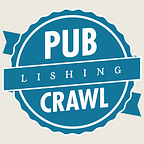This week JJ and Kelly talk subrights, or the pocket change of the publishing world! Also, our call for query submissions to be critiqued on our future query critique podcast is still open, so please send them in! Plus, more horror podcast recommendations.
Show Notes
A subsidiary right is the right to produce or publish a product in different formats based on the original material.
Primary subrights include:
First and second serial
Translation
Audio
Film/TV
Dramatic
Merchandising/Commercial
Graphic Novels
Secondary subrights include:
Library binding
Large print
Book club
Anthologies
Reach for the sky rights!
Theme park
Video games
Granting vs. retaining subrights
Retaining subrights:
If you retain a subright, you (or your agent) are responsible for the sale/licensing ("exploiting") of the subright
The advantage is that you would receive money from the sale/licensing directly (minus your agent and co-agent's commission).
Granting subrights:
If you grant a subright to the publisher, the publisher is responsible for exploiting those rights.
You and the publisher will split the proceeds from the sale/licensing (generally 50/50, but these splits can be negotiated)
The advantage of granting subrights is that money from the sale/licensing go against your advance, so you would earn out your advance faster and receive royalties on your book sooner
Real Life Example of Retaining Subrights
During the process of negotiation, your agent sells North American rights only for an advance of $10,000.
You make a foreign sale to a German publisher for $10,000.
The foreign co-agent takes 10%, your agent takes 10%, leaving you with $8000 to paid to you directly.
Advantage: You get $18,000 in hand.
Real Life Example of Granting Subrights
Let's say during the process of negotiation, you granted more subrights to the publisher for more advance money, so you sold World rights for an advance of $15,000.
The publisher makes a foreign sale to a German publisher for $10,000.
Because the split is 50/50, your publisher makes $5000, and you make $5000. The publisher applies this money against your advance, so now you need to sell $10,000 worth of royalties in order to start seeing royalty checks.
Advantage: You get $15,000 in hand, but will earn out faster.
PRO TIP: If you do grant subrights to the publisher, make sure there is language in your contract to ensure that these rights would revert back to you within a certain timeframe, should they go unexploited.
PRO TIP: Make sure you also have language that only grants explicitly listed rights to the publisher, e.g. "Any right not explicitly granted herein is retained by the author." Also, make sure you excise "whether now known or hereafter devised".
What We're Reading/Books Discussed
Blood Bound by Patricia Briggs
The Glass Sentence by S. E. Grove
The Witches: Salem, 1692 by Stacy Schiff
A Break with Charity by Ann Rinaldi
The Burning Sky, The Perilous Sea, and The Immortal Heights by Sherry Thomas
The Accident Season by Moira Fowley-Doyle
Imaginary Girls, The Walls Around Us, and 17 & Gone by Nova Ren Suma
Bone Gap by Laura Ruby
The Girl from Everywhere by Heidi Heilig
Tell the Wind and Fire by Sarah Rees Brennan
A Tale of Two Cities by Charles Dickens
Code Name Verity by Elizabeth Wein
The Book Thief by Markus Zusak
What We're Working On
Kelly is still working on her YA, and is also co-writing a MG with her friend.
JJ has seen cover concepts for Wintersong and is excited to share them with you in the future! She is still working on mental health, and is working on her Beauty and the Beast retelling VERY SLOWLY. She is also trying to write short fiction, to put more writing tools in her arsenal.
Off Menu Recommendations
Kelly went to see the Newsies musical on tour (musical soundtrack and of course, the movie!)
JJ went to see Deadpool this past weekend
Cooked by Michael Pollan
The Black Tapes podcast
Tanis podcast
That's all for this week! Next week we'll be starting a WRITING MECHANICS series, where we troubleshoot how to write a novel. First up: STRUCTURE.




